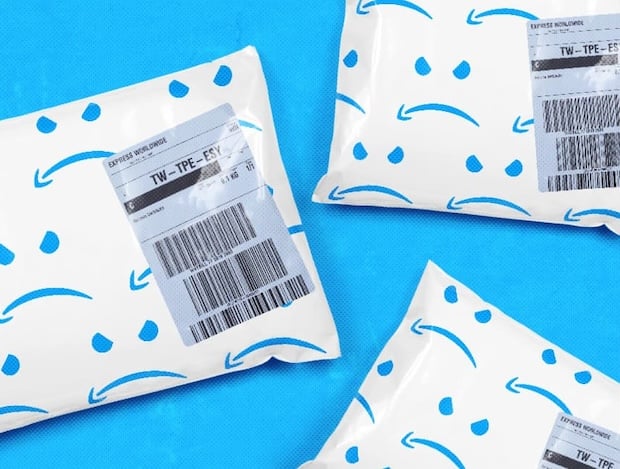Amazon’s Biggest Delivery: Millions of Pounds of Plastic Pollution
Published Jul 3, 2024

Amazon’s packaging waste is part of a larger crisis clogging our planet with plastic pollution and setting our climate ablaze. Here’s what you can do about it.
Update (October 10, 2024): Gift-giving season can be hard on the environment, especially when it comes to plastic pollution. You can learn more about the plastic pollution crisis in this article we published last Prime Day, and you can give back to the planet this season by volunteering with our Plastic Action Team!
The blue-and-white bubble mailer, signaling the arrival of an Amazon delivery, has become a ubiquitous sight in many neighborhoods. This month, these mailers will flood porches and mailboxes nationwide as the company rings in another Prime day. They’re also adding to the flood of plastic currently poisoning the environment, contributing to climate change, and infiltrating our bodies.
Plastic pollution has reached crisis levels across the globe, and packaging is a huge culprit. Globally, 44% of plastic is now made for packaging, tossed just seconds after it reaches customers’ hands.
Each year, Amazon contributes millions of pounds of plastic packaging waste to this crisis. And as the e-commerce behemoth prepares a new deluge of plastic this Prime Day, it’s clearer than ever that we need to hold corporations accountable for their waste.
Plastic Packaging Harms Our People and Planet on Multiple Fronts
According to one report, Amazon generated 709 million pounds of plastic packaging in 2021, with an estimated 26 million pounds destined to pollute our oceans and waterways. This endangers the already-battered ecosystems on which our planet depends. It also poses a huge threat to environmental and public health.
Plastic lasts for ages but slowly breaks down into smaller and smaller pieces — microplastics and even nanoplastics — that accumulate in our soil, water, and bodies. As it breaks down, it gets into the food we eat, the water we drink, and the air we breathe, harming humans and ecosystems around the globe.
Scientists are just starting to understand how plastic can enter our bodies and what happens when it does. Much of the danger comes from toxic additives added to plastic, including PFAS forever chemicals and known carcinogens like benzene. A recent study estimates that the effects of just a few plastic additives cost us $249 billion in healthcare in just one year.
On top of that, the plastics crisis is inextricably tied to the climate crisis. Making plastic is an energy-intensive process and almost all plastics come from fossil fuels. In the United States, that means fracked gas. In fact, new research suggests that the plastic industry produces four times the emissions of the airline industry.
Don’t Let Those Chasing Arrows Fool You. Plastic Packaging Isn’t Getting Recycled.
Amazon emblazons its mailers with the “chasing arrows” symbol and a link to information about recycling. Since most curbside recycling programs don’t take the film plastics used in packaging, people are directed to a drop-off program. Customers can bring the empty mailers to drop-off points, to be shipped off to other companies, supposedly for recycling.
However, drop-off programs have failed to work in practice. One study found that only a tiny fraction of Amazon’s plastic packaging makes it to a recycling sorting facility.
“All the claims the companies are making are just greenwashing. Recycling’s failed,” says an executive at a recycling company that partners with drop-off programs.
It’s not just Amazon’s packaging — in the U.S., only 5% of plastic gets recycled, even though most people dutifully fill their blue bins. Plastic is much more likely to end up in an incinerator, in a landfill, or shipped abroad, so other countries must deal with our mess. That’s because plastic recycling, especially the film used in packaging, isn’t profitable.
Corporations know this, but nevertheless, they push recycling programs as a greenwashing strategy. Plastic is cheap, and if they can convince us that they can use it without harming the planet — well, that’s perfect for their bottom line.
We Need Policies to End Our Plastic Pollution Crisis
The plastic pollution problem goes well beyond one company or industry. It’s baked into the political and economic system that allows corporations to pollute, profit, and harm the rest of us.
Plastic is cheap because corporations can offload its environmental and health costs onto the public. We’re paying for plastic through our clean-up efforts and our medical bills. On top of that, the oil, gas, and plastics industries receive massive subsidies funded by our taxpayer dollars.
However, there is good news: corporations can and do reduce their plastic packaging — when they are forced to by law. Following a ban on some single-use plastics in the European Union, Amazon has stopped using plastic delivery bags in Europe. There and in other places that have banned plastics, Amazon has replaced plastic packaging with paper or cardboard.
Stateside, our allies in Congress have reintroduced legislation to curb plastic pollution and hold polluters accountable. The Break Free from Plastic Pollution Act will ban some single-use plastics and make companies responsible for the waste they choose to create. Legislation like this is essential to stemming the tide of plastic trash, as is ending our reliance on fossil fuels.
As we’ve seen again and again, corporations will not do the right thing unless they are compelled to. We need strong policies that put public health and our planet over corporate profits. Our livable future depends on it.
Help us break free from plastic pollution and rein in corporate polluters. Tell your representatives to support the Break Free from Plastic Pollution Act!
Enjoyed this article?
Sign up for updates.
TO TOP


